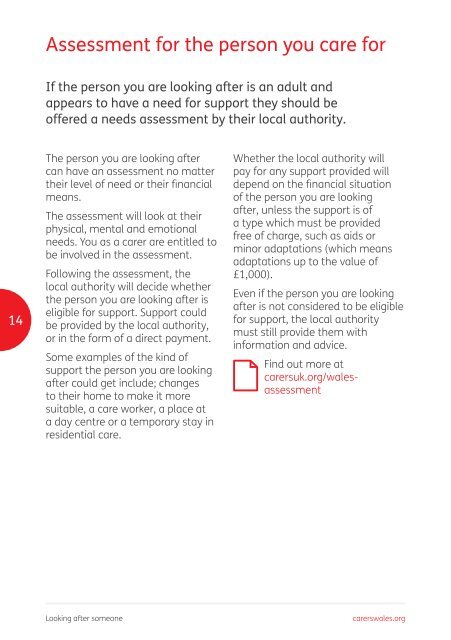Looking After Someone 2018
Create successful ePaper yourself
Turn your PDF publications into a flip-book with our unique Google optimized e-Paper software.
Assessment for the person you care for<br />
Coming out of hospital<br />
If the person you are looking after is an adult and<br />
appears to have a need for support they should be<br />
offered a needs assessment by their local authority.<br />
Deciding to care, or continue caring, for someone<br />
who is coming out of hospital can be very difficult.<br />
The person you are looking after<br />
can have an assessment no matter<br />
their level of need or their financial<br />
means.<br />
The assessment will look at their<br />
physical, mental and emotional<br />
needs. You as a carer are entitled to<br />
be involved in the assessment.<br />
Following the assessment, the<br />
Find out more at<br />
local authority will decide whether<br />
carersuk.org/wales/hospital<br />
Even if the person you are looking<br />
the person you are looking after is<br />
after is not considered to be eligible<br />
eligible for support. Support could<br />
14 for support, the local authority<br />
15<br />
be provided by the local authority,<br />
or in the form of a direct payment.<br />
Some examples of the kind of<br />
support the person you are looking<br />
after could get include; changes<br />
to their home to make it more<br />
suitable, a care worker, a place at<br />
a day centre or a temporary stay in<br />
residential care.<br />
Whether the local authority will<br />
pay for any support provided will<br />
depend on the financial situation<br />
of the person you are looking<br />
after, unless the support is of<br />
a type which must be provided<br />
free of charge, such as aids or<br />
minor adaptations (which means<br />
adaptations up to the value of<br />
£1,000).<br />
must still provide them with<br />
information and advice.<br />
Find out more at<br />
carersuk.org/walesassessment<br />
It is important to remember that<br />
it is your choice whether or not to<br />
take on a caring role.<br />
Before the person you are looking<br />
after comes home from hospital<br />
a discharge assessment should<br />
be carried out to see whether<br />
they need any support once they<br />
are discharged. This discharge<br />
assessment should look at whether<br />
the person you are looking after<br />
is eligible for; any intermediate or<br />
reablement care, NHS continuing<br />
Managing someone’s affairs<br />
healthcare or NHS-funded nursing<br />
care, other NHS services and/or<br />
community care services from the<br />
local authority.<br />
You should also be offered a carer’s<br />
needs assessment to see whether<br />
you as a carer need support once<br />
the person you are looking after is<br />
discharged.<br />
You may want to help manage the affairs of the<br />
person you are looking after, or may want to know<br />
how to plan for doing this in the future.<br />
There are different ways of<br />
managing someone’s affairs<br />
depending on whether the person<br />
you are looking after can currently<br />
make decisions for themselves<br />
(which is called having mental<br />
capacity) or whether they are<br />
unable to make decisions for<br />
themselves (which is called lacking<br />
mental capacity).<br />
Find out more at carersuk.org/<br />
managing-someones-affairs<br />
<strong>Looking</strong> after someone<br />
carerswales.org<br />
<strong>Looking</strong> after someone<br />
carerswales.org
















